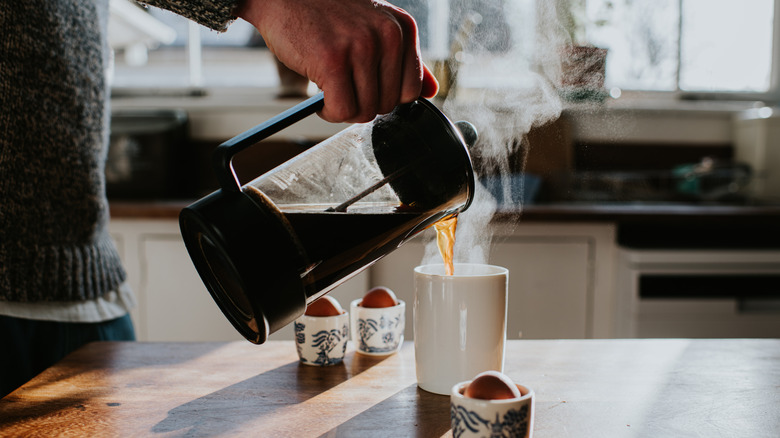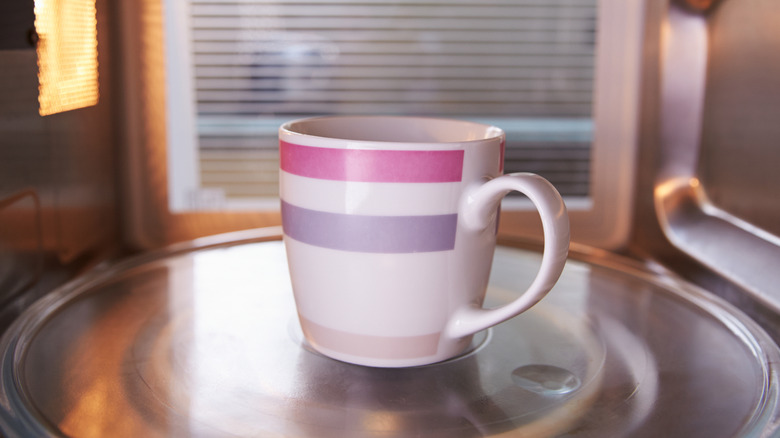Let's Be Real: Should You Reheat That Old Cup Of Coffee?
Many of us are no good without our morning coffee fix. But it's super annoying when you brew the perfect cup, take a few sips, and then get wrapped up in work or life. Before you know it, your coffee is completely cold. All that work, and now you have to decide whether to reheat it or not. If you pour it out, it feels cringe, like you're just being wasteful.
On the flip side, it's turned bitter and tastes nothing like the original cup of freshly-made coffee you started with. If you've ever bothered to read through all the relevant Reddit threads to determine whether or not you should reheat your coffee, you likely know there's a devout following both ways. Beyond figuring out if I should take the plunge and join the reheating club when I first became an avid coffee drinker, I wondered why it tasted so bad even when it's reheated.
Turns out, there's some science to why reheated coffee tends to taste worse. And why people, despite that risk, still choose to warm it up instead of starting from scratch. This is no minor choice for coffee lovers, but we shall prevail. There are times when pouring out a full mug and whipping out some fresh coffee grounds (with all your special mix-ins) seems impractical and the only option is tossing it in the microwave. To reheat, or not to reheat... that is the question.`
Why reheated coffee can taste so bad
Reheated coffee isn't the worst thing in the world, but the taste can be really off-putting and there's a reason for that. When coffee is initially brewed, it's a delicate blend of complex compounds which create its signature aroma and flavor. But when you reheat it, the chemical compounds start to break down in a way that can release burnt and sometimes metallic notes. Specifically, chlorogenic acid, a major compound in coffee, starts to degrade when exposed to heat a second time, releasing quinic and caffeic acids that can taste unpleasantly bitter.
Additionally, oxidation plays a role. As coffee sits, it interacts with air, causing further breakdown of its flavor profile. Reheating coffee just amplifies these effects. So, in a nutshell, those rich, smooth flavors of a fresh cup of java are nearly impossible to revive, which is why reheated coffee often disappoints. For purists, reheating might feel like a crime, but for those needing a quick caffeine boost, it might be a sacrifice worth making.
Why some people reheat anyway, and the best way to do it
Despite the potential for a horrible aftertaste, many people still reheat coffee for the sake of convenience or to avoid wasting an unfinished cup. Sometimes, it's about practicality. Not everyone has Starbuck's money for every single day and your favorite coffee chain (with all of its secrets) still adds up over time. Buying quality coffee to make at home yourself is also still expensive.
All this to say, I'm not always going to let a half-full mug go to waste. For busy folks, especially parents and professionals, a quick reheat might be the only way to keep up with a day that doesn't stop for multiple fresh brews. If you're going to reheat your coffee, consider opting for the stovetop instead of the microwave. Microwaves tend to heat their contents unevenly which can create hotspots that overcook certain parts of the coffee. You're not doing yourself any favors by making it taste worse than it already will when done right.
Warming coffee in a small saucepan over low heat might take an extra minute or two, but it's gentler and allows for more control over temperature. If you can't avoid the microwave, reheat your coffee for short intervals and stir in between to avoid overheating. The truth is, reheating won't replicate the flavor of a fresh cup, but these basic tips can help you salvage the taste... or at least make it tolerable.


